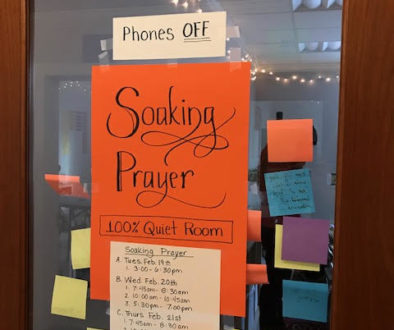Why do the demons try to prevent us from praying?
The brethren also asked Abba Agathon “Amongst all good works, which is the virtue which requires the greatest effort?” He answered “Forgive me, but I think there is no labour greater than that of prayer to God. For every time a man wants to pray, his enemies, the demons, want to prevent him. For they know that it is only by turning him from prayer that they can hinder his journey. Whatever good work a man undertakes, if he perseveres in it, he will attain rest. But prayer is warfare to the last breath.” Abba Agathon, Sayings of the Desert Fathers
Lately I’ve noticed a shift in how Christians market the praying life. Beginning your day with a fifteen-minute quiet time, preferably a blend of devotional reading with prayer time, is said to be a game-changer for the rest of the day. You’ll be more centered, more mindful, more calm, more thankful, more attuned to God. We could call these the subjective benefits of prayer.
I certainly have experienced these subjective benefits of prayer myself. My day feels significantly “thrown off” when I fudge on my discipline of praying the Morning Office. Confession puts me in a spirit of dependence on God’s grace. The words of assurance… well, they reassure me. My openness towards whatever stuff may happen that day depends a lot on praying through the General Thanksgiving.
But is all that the reason the demons try to keep us from praying, as Father Agathon replied? I doubt it. If they want to stop a Christian dead in her tracks on her path to God, they single out prayer out of all the “virtues,” “labours,” “good works,” etc. Why not turn her from works of mercy? Or toward temptations to money, sex, or power? Or vices like drinking or gambling? To be sure, these are all battlegrounds of spiritual combat. But there’s something about prayer in particular that, if only the demons could stand in its way, then they’ve thrown the Christian off her journey entirely. So what is that “something” about the praying life?
I recently found a clue to this question while reading an excellent biography of Napoleon Bonaparte. It struck me how vital it’s been throughout military history for an army to maintain what’s known as its “lines of communication” (LOC). Before modern telecommunications, all orders and news of the battle had to be carried on horseback or on foot along these special routes. Even today, an army has to make sure it protects a route between units in the field and its supply base, or else the field units are completely cut off from reinforcements or supplies. Part of Napoleon’s military genius was in making sure his own lines were short and well-defended, while taking advantage of his adversaries’ more vulnerable LOC.
 Abba Agathon seems to be treating prayer with the same gravity as Napoleon treated his lines of communication in battle. Prayer requires great effort because it’s so vital to the Christian’s walk with God. If we do not maintain constant contact with our heavenly Father, we cut ourselves off from “every good and perfect gift from above” (James 1:17). We may well excel in other good works, just as a unit may be composed of very skilled soldiers. In fact, Abba Agathon implies, any given “good work” is relatively easy. Keep at it long enough and eventually it’s over.
Abba Agathon seems to be treating prayer with the same gravity as Napoleon treated his lines of communication in battle. Prayer requires great effort because it’s so vital to the Christian’s walk with God. If we do not maintain constant contact with our heavenly Father, we cut ourselves off from “every good and perfect gift from above” (James 1:17). We may well excel in other good works, just as a unit may be composed of very skilled soldiers. In fact, Abba Agathon implies, any given “good work” is relatively easy. Keep at it long enough and eventually it’s over.
Prayer, on the hand, is our lifeline to God. Let go for a moment, and the battle is lost.
For my part, I think Abba Agathon is getting at prayer as a fundamentally objective act, as “real” an activity as the exercise of any of the other virtues, and perhaps more so. Reading into Abba Agathon’s words a little bit, we are objectively asking a God who is really out there to materially alter the course of our day–or, indeed, our entire lives. Prayer effects change. So if prayer does make your day better, it is because a God who is there heard your praises, thanksgivings, and petitions, and He acted on your behalf. Now that makes the demons shudder.
~David Griffin

